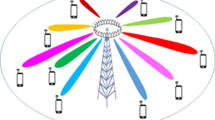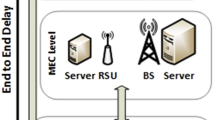Abstract
SC-FDMA is the most suitable option for the LTE-A uplink. Contiguity plagiarism characteristics are required for optimum channel scheduling in an SC-FDMA system. The right scheduling in the uplink will maximise the user experience and network efficiency. Channel scheduling requires a proper formation of the matrix as an input. The structure of the matrix should be intelligent enough to consider the allocated bandwidth and number of serving users within the range of the active serving cell. In this paper, a weight based resource scheduling (WBRS) algorithm has proposed to improve the network performance in the LTE-A uplink femtocell network. Simulation results show that the WBRS performs better for uplink and eliminates the gap of the current channel scheduling algorithms for the LTE-A femtocell.





Similar content being viewed by others
References
3GPP: (2009). 3rd generation partnership project; technical specification group radio access network; evolved universal terrestrial radio access (e-utra); physical layer procedures.
Elnashar, A., El-saidny, M. A., Elnashar, A., El-saidny, M., & Sherif, M. (2014). LTE network architecture and protocols. In Design, deployment and performance of 4G-LTE networks (pp. 1–45).
3GPP: (2008). Technical specification group radio access network, further advancements for e-utra physical layer aspects-release 9.
3GPP: (2012). Technical specification group services and system aspects;telecommunication management;self-organizing networks (son) policy,network resource model (nrm) ,integration reference point (irp);requirements-release 13.
Geetha, M. N., & Mahadevaswamy, U. B. (2020). Performance evaluation and analysis of peak to average power reduction in OFDM signal. Wireless Personal Communications. https://doi.org/10.1007/s11277-020-07140-5.
Falahati, A., & Anarakifirooz, E. (2019). Weighted sum rate maximization under the given papr constraints for a multi-user ofdm system. Wireless Personal Communications, 109(1), 127–137.
Marwat, S. N. K., Weerawardane, T., Zaki, Y., Goerg, C., & Timm-Giel, A. (2014). Analysis of radio resource allocation in lte uplink. Wireless Personal Communications, 79(3), 2305–2322.
Ahmad, A. (2014). Resource allocation and adaptive modulation in uplink sc-fdma systems. Wireless Personal Communications, 75(4), 2217–2242.
de Temino, L. A. M. R., Berardinelli, G., Frattasi, S., & Mogensen, P. (2008). Channel-aware scheduling algorithms for sc-fdma in lte uplink. In 2008 IEEE 19th International Symposium on Personal, Indoor and Mobile Radio Communications (pp. 1–6). IEEE.
Lim, J. H., Ahmad, B., Jusoh, M., & Sabapathy, T. (2017). Deployment of resource allocation and power control schemes in long term evolution advanced (lte-a) hybrid network. Wireless Personal Communications, 96(2), 2943–2963.
Dhilipkumar, S., Arunachalaperumal, C., & Thanigaivelu, K. (2019). A comparative study of resource allocation schemes for d2d networks underlay cellular networks. Wireless Personal Communications, 106(3), 1075–1087.
Mae, A. E., Kwee, W. K., & Anwar, K. (2014). A study on uplink scheduling techniques in lte. In 2014 International conference on electronics, information and communications (ICEIC) (pp. 1–2). IEEE.
Wang, H. L., Kao, S. J., & Chang, F. M. (2014). An activity selection based single carrier-frequency division multiple access uplink scheduling for lte networks (vol. 3, pp. 1493–1496).
Holma, H., & Toskala, A. (2009). LTE for UMTS: OFDMA and SC-FDMA based radio access. New York: Wiley.
Altabbaa, M. T., Arsan, T., & Panayirci, E. (2019). Subchannel allocation and power control for uplink femtocell radio networks with imperfect channel state information. Wireless Personal Communications, 108(3), 1345–1361.
Kim, W., Kaleem, Z., & Chang, K. (2017). Interference-aware uplink power control in 3g pp lte-a hetnet. Wireless Personal Communications, 94(3), 1057–1071.
Sandrasegaran, K., Ramli, H. A. M., & Basukala, R. (2010). Delay-prioritized scheduling (dps) for real time traffic in 3gpp lte system. In 2010 IEEE wireless communication and networking conference (pp. 1–6). IEEE.
Noliya, A., & Kumar, S. (2020). Performance analysis of resource scheduling techniques in homogeneous and heterogeneous small cell LTE-A networks. Wireless Personal Communications. https://doi.org/10.1007/s11277-020-07156-x.
Tan, K. C., Lee, T. H., Khoo, D., & Khor, E. F. (2001). A multiobjective evolutionary algorithm toolbox for computer-aided multiobjective optimization. IEEE Transactions on Systems, Man, and Cybernetics, Part B (Cybernetics), 31(44), 537–556.
Karar, S., & Barman, A. D. (2015). Opportunistic sub-channel and transmit power allocation in an ofdma based cognitive femtocell network. Wireless Personal Communications, 84(2), 1303–1323.
Kaddour, F. Z., Vivier, E., Mroueh, L., Pischella, M., & Martins, P. (2014). Green opportunistic and efficient resource block allocation algorithm for lte uplink networks. IEEE Transactions on Vehicular Technology, 64(10), 4537–4550.
Wang, H. L., & Kao, S. J. (2015). Activity selection-based single carrier-frequency division multiple access uplink scheduling for two-tier lte networks. Wireless Personal Communications, 82(1), 625–642.
Liu, F., She, X., Chen, L., & Otsuka, H. (2010). Improved recursive maximum expansion scheduling algorithms for uplink single carrier fdma system. In 2010 IEEE 71st vehicular technology conference (pp. 1–5). IEEE.
Tsiropoulou, E. E., Kapoukakis, A., & Papavassiliou, S. (2016). Uplink resource allocation in sc-fdma wireless networks: A survey and taxonomy. Computer Networks, 96, 1–28.
Attia, E. S., El-Dolil, S. A., & Abd-Elnaby, M. (2018). Spectrum allocation for enhanced cross-tier interference mitigation with throughput improvement for femtocells in a heterogeneous lte cellular network. Wireless Personal Communications, 101(3), 1671–1683.
Lim, J., Myung, H. G., Oh, K., & Goodman, D. J. (2006). Proportional fair scheduling of uplink single-carrier fdma systems. In 2006 IEEE 17th international symposium on personal, indoor and mobile radio communications (pp. 1–6). IEEE.
Shgluof, I., Ismail, M., & Nordin, R. (2017). An enhanced system information acquisition scheme for csg femtocells in 3g pp lte/lte a systems. Wireless Personal Communications, 96(3), 3995–4011.
Arafat, O., & Gregory, M. A. (2019). A weight based channel scheduling for lte-a femtocells. In 2019 29th international telecommunication networks and applications conference (ITNAC) (pp. 1–5). IEEE.
Kim, K., Han, Y., & Kim, S. L. (2005). Joint subcarrier and power allocation in uplink ofdma systems. IEEE Communications Letters, 9(6), 526–528.
Narasimhan, H., Kashyap, R., Vikram, A., Deepthi, R., & Wali, P. (2017). Greedy search algorithm based two stage energy saving technique for dense lte-a hetnets. In 2017 international conference on advances in computing, communications and informatics (ICACCI) (pp. 894–899). IEEE.
Ro, J. H., Lee, E. H., & Song, H. K. (2017). Adaptive femtocell design scheme in mobile communication systems. Wireless Personal Communications, 97(1), 811–820.
Yang, B., Niu, K., He, Z., Xu, W., & Huang, Y. (2013). Improved proportional fair scheduling algorithm in lte uplink with single-user mimo transmission. In 2013 IEEE 24th annual international symposium on personal, indoor, and mobile radio communications (PIMRC) (pp. 1789–1793). IEEE.
Author information
Authors and Affiliations
Corresponding author
Additional information
Publisher's Note
Springer Nature remains neutral with regard to jurisdictional claims in published maps and institutional affiliations.
Rights and permissions
About this article
Cite this article
Arafat, A.O., Gregory, M.A. A Weight-Based Resource Scheduling Algorithm for Uplink LTE-A Femtocell Network. Wireless Pers Commun 114, 1945–1961 (2020). https://doi.org/10.1007/s11277-020-07456-2
Published:
Issue Date:
DOI: https://doi.org/10.1007/s11277-020-07456-2




